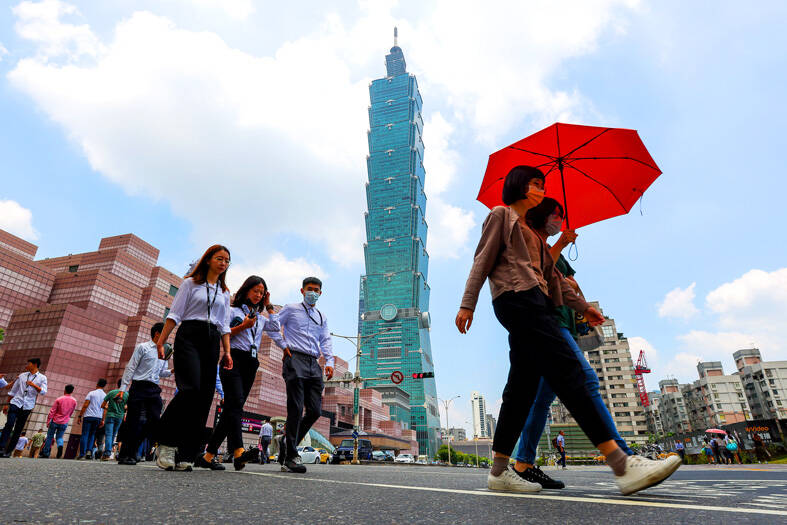The Ministry of Health and Welfare reported 236 cases of heat injury between July 1 and Saturday, twice the amount as the same period last year, but summer is also the peak period for acute cardiovascular events, the symptoms of which are often ignored given their similarity to heat injury, a doctor said on Sunday.
Heatstroke occurs when the body can no longer control its temperature as it rises above 40°C. The skin might turn red and dry and become hot, and the affected person might lose consciousness, the Health Promotion Administration (HPA) said.
Left untreated, heatstroke can quickly lead to shock, heart failure, multiple organ failure, rhabdomyolysis (rapid break down of damaged muscle tissue), disseminated intravascular coagulation (abnormal blood clotting) and other fatal complications.

Photo: Ritchie B. Tongo, EPA-EFE
Cathay General Hospital cardiovascular intensive care unit director Chang Chao-chien (張釗監) said that aside from heatstroke, heat causes blood vessels to widen, increasing blood flow and lowering blood pressure.
If a person sweats a lot, but does not drink enough water, their blood can thicken, causing increased risk of coronary or cerebrovascular occlusion, Chang said.
Drastic temperature changes, such as entering an air-conditioned room from a heated outdoor environment, can also increase blood pressure and the risk of cardiovascular events, he said.
Chest tightness and pain, cold sweats and shortness of breath are common symptoms of a heart attack, and severe symptoms include shock, an irregular heartbeat or sudden cardiac arrest, he said, adding that heat can cause sudden death.
People should seek immediate medical attention when experiencing these symptoms, he said.
Older adults are more prone to heatstroke when exposed to high temperatures and humidity, so they should drink plenty of water, avoid direct sun exposure to the skin, wear cooling clothing and stay in cool environments, to avoid dehydration, heat exhaustion and skin injury, doctors say.
The HPA said that older adults have reduced environmental sensitivity, and might collapse or lose consciousness before they are even aware of the early signs of heatstroke, but as the body temperature has risen too much, they might have brain damage or be at risk of death.
Moreover, many older adults take daily medication for chronic diseases, but it might affect blood flow or decrease their ability to sweat, limiting their body’s ability to dissipate heat, such as antihistamines for relieving symptoms of allergies, diuretics used in the management of hypertension, beta blockers and calcium channel blockers, it said.
Extreme heat can also worsen cardiovascular disease, forcing the heart to pump harder and beat faster to reroute more blood to the skin, and people with heart disease would be at higher risk of heart failure, it said.
In addition to drinking plenty of water and taking precautions when going out in the heat, older adults should also get regular health checkups, the HPA said.
When people notice signs of suspected heat injury, they should immediately leave the hot environment, try to lower their body temperature and seek medical attention, it said.

An essay competition jointly organized by a local writing society and a publisher affiliated with the Chinese Communist Party (CCP) might have contravened the Act Governing Relations Between the People of the Taiwan Area and the Mainland Area (臺灣地區與大陸地區人民關係條例), the Mainland Affairs Council (MAC) said on Thursday. “In this case, the partner organization is clearly an agency under the CCP’s Fujian Provincial Committee,” MAC Deputy Minister and spokesperson Liang Wen-chieh (梁文傑) said at a news briefing in Taipei. “It also involves bringing Taiwanese students to China with all-expenses-paid arrangements to attend award ceremonies and camps,” Liang said. Those two “characteristics” are typically sufficient

The brilliant blue waters, thick foliage and bucolic atmosphere on this seemingly idyllic archipelago deep in the Pacific Ocean belie the key role it now plays in a titanic geopolitical struggle. Palau is again on the front line as China, and the US and its allies prepare their forces in an intensifying contest for control over the Asia-Pacific region. The democratic nation of just 17,000 people hosts US-controlled airstrips and soon-to-be-completed radar installations that the US military describes as “critical” to monitoring vast swathes of water and airspace. It is also a key piece of the second island chain, a string of

A magnitude 5.9 earthquake that struck about 33km off the coast of Hualien City was the "main shock" in a series of quakes in the area, with aftershocks expected over the next three days, the Central Weather Administration (CWA) said yesterday. Prior to the magnitude 5.9 quake shaking most of Taiwan at 6:53pm yesterday, six other earthquakes stronger than a magnitude of 4, starting with a magnitude 5.5 quake at 6:09pm, occurred in the area. CWA Seismological Center Director Wu Chien-fu (吳健富) confirmed that the quakes were all part of the same series and that the magnitude 5.5 temblor was

The Central Weather Administration has issued a heat alert for southeastern Taiwan, warning of temperatures as high as 36°C today, while alerting some coastal areas of strong winds later in the day. Kaohsiung’s Neimen District (內門) and Pingtung County’s Neipu Township (內埔) are under an orange heat alert, which warns of temperatures as high as 36°C for three consecutive days, the CWA said, citing southwest winds. The heat would also extend to Tainan’s Nansi (楠西) and Yujing (玉井) districts, as well as Pingtung’s Gaoshu (高樹), Yanpu (鹽埔) and Majia (瑪家) townships, it said, forecasting highs of up to 36°C in those areas